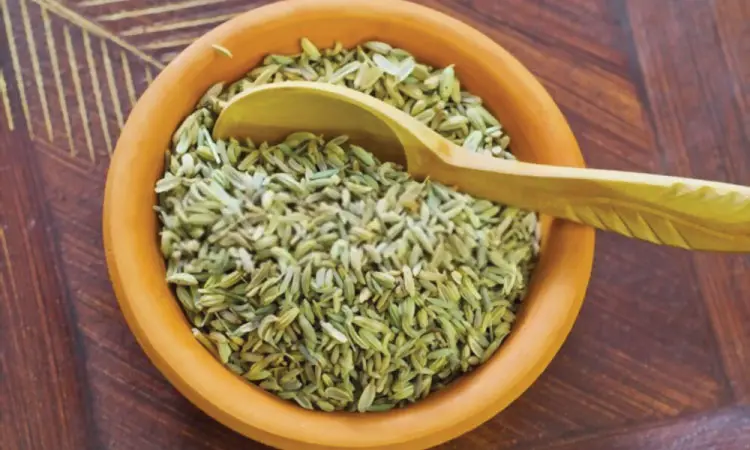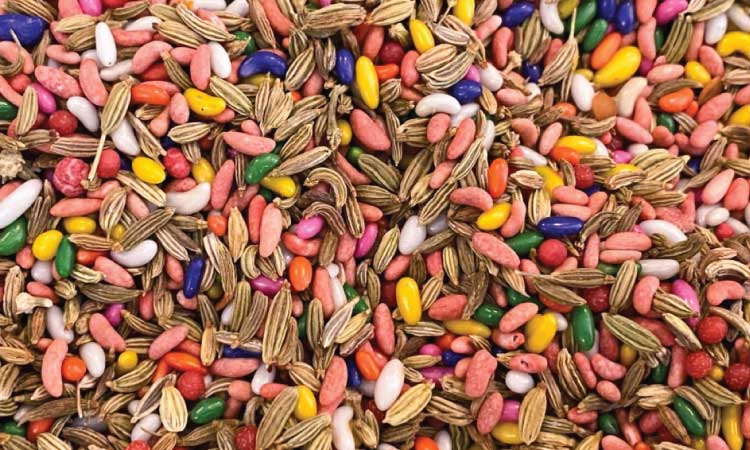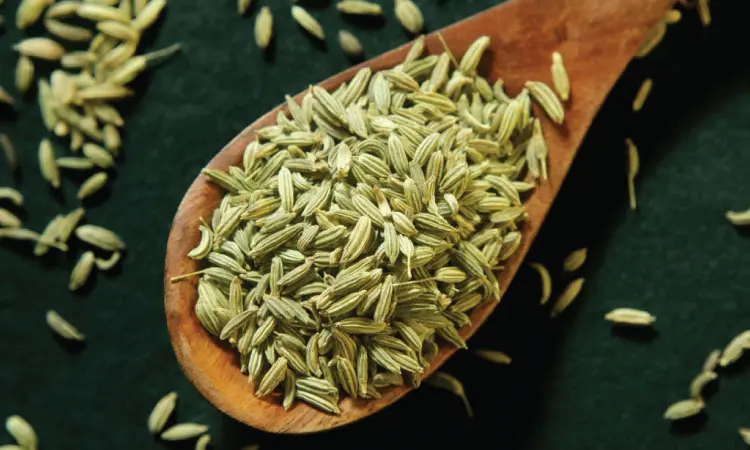The main concern for any newly pregnant woman is what they eat regularly that they need to be cautious about. Perhaps you might be wondering in particular if you can eat fennel seeds during pregnancy. If that is the case, do not worry. We’ve got you covered.
This article will shed some light on what fennel seeds are, what forms they come in, and whether you can eat them during pregnancy.
What Are Fennel Seeds?
Fennel seeds are also commonly known as saunf. They are herbs that are commonly used to eat raw and also as a condiment in cooking by many people. They are aromatic. Fresh fennel seeds look brown or green. Saunf belongs to the parsley family and originates from Europe. Many people also use it as mouth fresheners. It has several health benefits and uses. So, they have both medical and culinary uses.

However, many herbs are dangerous during pregnancy. So, is fennel one of them? Is it safe or unsafe to eat saunf during pregnancy?
Can I Eat Fennel Seeds During Pregnancy?
It is safe to consume fennel seeds during pregnancy, as long as you only have them in limited amounts. Fennel seeds do have several health benefits such as relief from bloating and gas issues. However, they also have some potential side effects.
So, it can be very dangerous to you and your baby’s health to have too much.
But there is no reason a small amount is dangerous. So it is totally fine for you to add a bit of saunf to flavor your food.
Of course, if you are unsure about this, the best option is always to contact your doctor to make sure it is safe for you to eat a particular quantity of fennel seeds during pregnancy.
Calculate Due Date With LMP
Health Benefits Of Fennel Seeds During Pregnancy

Fennel seeds have several health benefits. They have been used as medicinal herbs since a long, long time ago. Here are a few benefits of eating saunf during pregnancy.
1. Helps with digestion
Fennel seeds are naturally carminative. This means that they have anti-flatulence properties. They also help to stimulate bile flow, which is important for digestion. Fennel seeds are a rich source of fibers, which help to prevent constipation, as well as numerous other things.
Related Reading: 11 Home Remedies For Acid Reflux During Pregnancy
So, having fennel seeds during pregnancy can really improve your digestion. This is very useful as pregnant women often suffer from indigestion.
2. Helps with morning sickness
Saunf has been known to help ease morning sickness for a long time and is a traditional remedy for nausea. Fennel seeds have mild anesthetic properties. This helps to ease queasiness in your stomach and helps reduce nausea. Hence they help reduce the effects of morning sickness. They are mainly used for this purpose during the first trimester.
3. Reduces bloating
Accumulation of gas is one of the main causes of bloating. As mentioned above, fennel seeds have anti-flatulence properties. This helps get rid of gas, thus reducing bloating.
4. Improves your appetite
Many pregnant women have to face sudden changes regarding their bodies. This often includes a loss of appetite. Luckily, eating fennel seeds during pregnancy can recover your appetite. This is because saunf encourages healthy digestion. This leads to you having a better appetite.
5. Relieves heartburn
Fennel seeds, or saunf, contain a special oil that is very good for relieving problems relating to digestion. It soothes the stomach lining. It also reduces acid reflux. Thus, it can be used to relieve heartburn.
6. Rich in nutrients
Other than these benefits, fennel seeds also have another unique feature. They are rich in various nutrients and important minerals. These include:
- Vitamin C
- Potassium
- Manganese
- Iron
- Calcium
All these nutrients are very important for the healthy development of the baby and the overall health of the pregnant woman.
7. Fertility
Of course, this isn’t really a concern for pregnant women. But it can be considered a benefit if you are trying to get pregnant, or planning to have more children in the future.
There is a definite relation between fennel and fertility. Fennel contains estrogen, which affects the fertility of a woman, as well as secondary sexual characteristics. So consuming fennel seeds can improve fertility.
8. Baby’s complexion
Some ayurvedic traditions suggest that you can consume fennel seeds during pregnancy for a fair baby. However, please do not be hung up over the complexion of your baby. Fair or dark, they are still your flesh and blood, whom you should love with all your heart.
Related Reading: 10 Foods That Make Breast Milk Taste Good (Indian)
Side Effects of Fennel Seeds

Even though fennel seeds have so many health benefits, they also have some potential side effects. It is easy to see only the benefits and get addicted to fennel seeds during pregnancy, but this can be dangerous. This is why it is imperative that you only eat saunf in a reasonable amount. The side effects are as follows:
1. Can trigger menstruation
One of the main reasons you must not eat too many fennel seeds during pregnancy is due to its emmenagogue properties. These emmenagogue properties mean that eating too much saunf can trigger menstrual flow. This may induce periods, possibly leading to miscarriage and several other complications.
2. Can reduce blood clotting
This may sound like a good thing but it is really not.
Fennel seeds have properties that slow down your blood’s ability to clot or coagulate. This means that if you get hurt, and start bleeding, your blood will not be able to clot as fast.
So, if you have any blood disorder that already affects your blood’s ability to clot, then you should abstain entirely from fennel seeds during pregnancy. This is especially important if you are prone to getting hurt or bleeding.
3. Dries the skin
If you are susceptible to having dry skin, or if you have sensitive skin, you should probably try to avoid or reduce your consumption of fennel seeds during pregnancy. This is because fennel seeds have a tendency to cause your skin to dry.
This can have negative impacts, especially since your skin is already prone to dryness during pregnancy.
4. Premature contractions
Fennel seeds contain some properties that can be both helpful in some situations, unhealthy in others.
For example, they contain phytoestrogens, antispasmodic, and anti-inflammatory properties. This causes the uterus to be stimulated, which could cause premature contractions.
This can lead to several complications, up to and including miscarriage or preterm labor.
5. Allergies
It goes without saying that you should completely avoid foods you are allergic to, especially when you are pregnant. If you are allergic to things like celery, mugwort, or carrot, you might be allergic to fennel too.
If you are unsure whether you are allergic to something, you should consult your doctor and find out.
Does Fennel Cause Miscarriage?
Yes, indeed. As mentioned above, fennel seeds have emmenagogue properties. Eating excess amounts of fennel seeds can induce menstruation, thereby increasing the risk of miscarriage significantly. In fact, fennel seeds and miscarriage have been considered connected for a long time.
In ancient times, there was a type of fennel that was specifically used for abortion and birth control. So, it is clear that this is a real risk.
Related Reading: 12 Early Pregnancy Tips To Avoid Miscarriage
However, this is only a danger if you eat fennel seeds during pregnancy in large amounts.
You should be okay by eating just a little amount of fennel seeds each day.
Can I Drink Fennel Tea While Pregnant?
Fennel tea is a great way to consume fennel seeds during pregnancy. Just make sure that it is made of no more than one teaspoon of fennel seeds. Herbal tea is also an unpredictable subject when it comes to pregnancy. Some are safe, some are not. So being alert is important. As long as you do that, you can safely drink fennel tea during pregnancy once in a while.
Many expecting mothers drink fennel tea regularly as it has many benefits, including easing nausea and morning sickness. So fill up that cup and relax on a comfy couch!
However, as always, make sure that all the ingredients you use are clean and safe beforehand. Pregnancy is a time when you should be more cautious than usual.
How Much Fennel Seed Should I Eat Per Day?

You should only eat a very small amount of fennel seeds, or saunf, during pregnancy. This is due to the many potential side effects that make it dangerous for both mother and unborn child to eat too many fennel seeds.
It is probably safe for you to use just a little bit – that is, about one teaspoon or so – in your food.
However, many factors can change the number of fennel seeds that are safe for you to consume. So it is best to consult a doctor to find out an acceptable amount, considering your health requirements.
Conclusion
Fennel seeds are sweet, aromatic herbs that have several health benefits. It can be incredibly beneficial for pregnant women to consume them. However, there are side effects you should keep in mind too. Hence, it is important that you only eat very small amounts of fennel seeds.
If you find a safe and comfortable amount you can consume, then fennel seeds can provide a near-instant relief to many problems pregnant women face.
